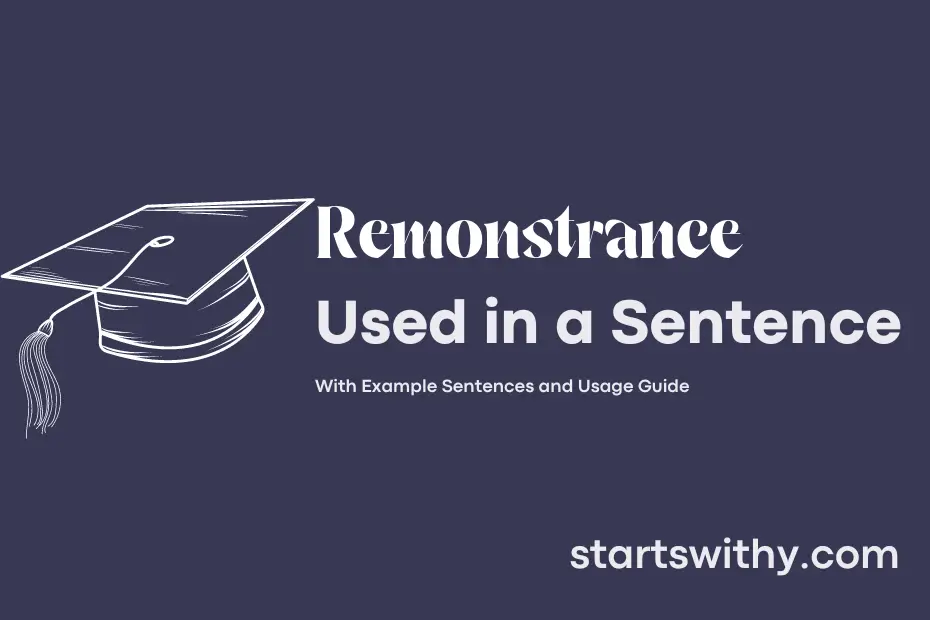Have you ever found yourself in a situation where you needed to express strong disapproval or objection? This act of protest or rebuke is commonly known as a “remonstrance.” A remonstrance is a formal expression of dissent or objection, often in response to something that is perceived as unfair, unjust, or improper.
In a remonstrance, individuals lay out their grievances and present reasons for their disapproval in a clear and forceful manner. This form of protest can be written or verbal and is typically aimed at rectifying the issue at hand or highlighting a specific concern.
7 Examples Of Remonstrance Used In a Sentence For Kids
- The teacher’s face turned red with remonstrance.
- She stamped her foot in remonstrance.
- He shook his finger in remonstrance.
- The parent’s eyes filled with remonstrance.
- The principal’s voice was full of remonstrance.
- The coach’s tone held a hint of remonstrance.
- The student’s face showed clear remonstrance.
14 Sentences with Remonstrance Examples
- Remonstrance against the steep increase in tuition fees has been a hot topic of discussion among college students in India.
- Despite numerous remonstrances from the student body, the administration proceeded with the implementation of a strict attendance policy.
- The student council issued a formal remonstrance to the college management regarding the inadequate library facilities.
- A group of students organized a peaceful protest as a form of remonstrance against the lack of female representation in the college’s leadership positions.
- The professor received a remonstrance from the students after assigning a project with an unrealistic deadline.
- The college administration was taken aback by the overwhelming remonstrance they received from the students about the poor quality of cafeteria food.
- The student union drafted a formal remonstrance to address the issue of delayed exam results affecting students’ future academic plans.
- Despite facing remonstrances from their peers, a group of students continued to engage in disruptive behavior during lectures.
- The college principal held a meeting with student representatives to discuss the remonstrances they had raised regarding concerns over the lack of mental health support services on campus.
- The sudden increase in hostel fees sparked a wave of remonstrance among students who found it difficult to afford the added financial burden.
- A petition was circulated among students to gather support for a collective remonstrance against the college’s unfair grading practices.
- The Dean of Students Affairs invited feedback and remonstrances from students during a town hall meeting aimed at improving campus life.
- The student body president submitted a list of remonstrances on behalf of the students to the college management outlining issues ranging from lack of infrastructure to inadequate sports facilities.
- Despite facing initial remonstrance from students, the college administration eventually agreed to extend the deadline for submission of semester projects.
How To Use Remonstrance in Sentences?
To Remonstrate means to make a forceful protest or objection, often in a formal or official way. When using this word in a sentence, it is important to understand its context and usage.
Here is a guide on how to use Remonstrate in a sentence for beginners:
-
Identify the situation where you want to express a strong objection or protest. This could be in response to something someone said or did that you strongly disagree with.
-
Think about how you can convey your objections or protests in a formal manner. It can be helpful to use polite and respectful language while still making your point clear.
-
Craft your sentence by starting with “I remonstrate” followed by the reason for your protest or objection. For example, “I remonstrate against the decision to cut down the trees in the park.”
-
Make sure your sentence clearly conveys your strong dissent or protest, and that the context is clear to the reader.
By following these steps, you can effectively use Remonstrate in a sentence to express your objections or protests in a formal and forceful manner. Remember to use this word thoughtfully and appropriately in the right context.
Conclusion
In conclusion, the sentences with “remonstrance” highlighted the act of objecting or protesting against something. They demonstrated strong expressions of disapproval or disagreement, often emphasizing a sense of urgency or severity in the objections raised. These sentences effectively conveyed the speaker’s firm stance and served as powerful tools for highlighting issues and seeking redress.
By analyzing various sentences utilizing “remonstrance,” we can appreciate the effectiveness of utilizing such strong language to make a point. They serve as reminders of the importance of standing up for what one believes in and voicing dissent when necessary. These sentences underscore the power of asserting one’s opinions and challenging circumstances that are perceived as unjust or unacceptable.



